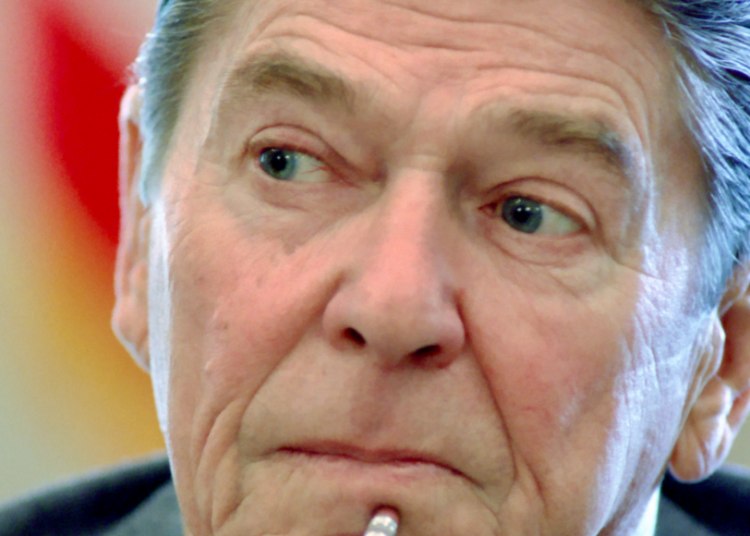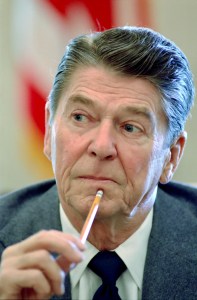Nearly three decades after the Reagan administration ended, several views of the fortieth president—all conflicting—have taken hold in the American popular mind. One is that Reagan was an “amiable dunce,” who was “sleepwalking through history.” Luck and circumstances made him a successful president, but he should be remembered today only as an oaf, simply being in the right place at the right time. Another story argues that Reagan was a political genius (if not necessarily an intellectual giant) and that every politician today, regardless of political views, should learn from his eight years and attempt to recapture his charisma. Yet a third story, mostly told among generations born after his presidency, is that he was just president number forty, really no better and no worse than any other president. A fourth story focuses on Reagan’s supposed under-handed deals with Iran and remembers him mostly by the actions of his proxy, Colonel Oliver North. Perhaps, dementia and Alzheimer’s had already set in, maybe even augmented by the bullet he took in 1981. A final story, promoted by nearly every member of the Reagan administration, is that Reagan really was a genius in every sense of the word, and through that genius he brought back American greatness and destroyed the Soviets’ ability to project communist ideals abroad and at home. Reagan, these compatriots have argued, almost single-handedly brought down the Soviet Union and its communist allies.
Before addressing the claims of these schools of thought on Reagan, one ought to analyze with deep scrutiny the circumstances surrounding his commencement address of May 17, 1981, given at the University of Notre Dame. One of the strongest indicators of Reagan’s involvement in his own two administrations is just how much he himself put into the Notre Dame speech, which was delivered shortly after his recovery from John Hinckley’s March 30th assassination attempt. Reports about who wrote the speech, at the time and later, conflict. Lou Cannon, who had followed Reagan’s career for years, claimed on the eve of the speech:
Reagan’s speech at Notre Dame is the first he will give since his inauguration without the services of former chief speechwriter Ken Khachigian, who has returned to his consulting business in California. A draft of this speech was prepared by Anthony Dolan, and the president, as usual, made several changes.[1]
This was speculation on Cannon’s part, as he cited no one in the administration or near Reagan as evidence of his assertion. For United Press International, reporter Helen Thomas more convincingly argued that Reagan had written the speech himself, having gotten this information directly from Reagan aide and speechwriter, Larry Speaks.[2] While it would certainly not be impossible that Reagan sought advice and, most likely, even an editorial eye, the most convincing conclusion is that Reagan wrote the speech himself. In terms of style, story-telling, and personal philosophy, it radiates Reaganism in every way. As Martin and Annelise Anderson have effectively argued, Reagan was not merely a politician and a thinker, but also, at every level, a writer. “Even Reagan’s own staff was surprised at the extent to which he had been developing his own policy views and crafting his own speeches over the years,” the couple explain. The President’s people “did not know that Reagan was, in truth, a writer. Whatever else he was doing—as student, sportscaster, Hollywood actor, representative for General Electric, governor, private citizen, president—Ronald Reagan wrote.” And, he wrote in a variety of ways and styles, always thinking his way through a problem while also convincing others of his analysis: “He wrote short stories, articles, radio commentaries, speeches, letters, two autobiographies, and, during his years in the White House, a personal diary.”[3] Given this history, there is no reason to believe that the author was anyone other than Reagan.
Of course, much has become available to scholars over the last twenty-five years. Far from the image of him advocated by those opposed to Reagan as an “amiable dunce,” he possessed serious intellectual talents.
As a trained and successful actor, he had a nearly photographic memory. Second, he read everything he could get his hands on. Dick Allen, his close friend and first National Security advisor, said he was a “voracious reader.”[4] The politically moderate David Gergen praised Reagan’s intelligence without even the pretense of diffidence:
Working for him, I saw he was no dullard, as his critics claimed. From his eight years as governor and his many other years of writing and speaking out, he had thought his way through most domestic issues and knew how to make a complex governmental structure work in his favor. In the first year of his presidency, I also saw him dive into the details of the federal revenue code and become an authority as he negotiated with Congress. When he wanted to focus, he had keen powers of concentration and could digest large bodies of information. He was also one of the most disciplined men I have seen in the presidency (much more so than Clinton, for example), sot that he worked straight through the day, reading papers and checking off meetings on his list. At day’s end, headed off for a workout and would plow through more papers in the evening in the upstairs residence. He made the presidency look easy in part by keeping a strict regimen. He also had a retentive mind. After years of memorizing scripts in Hollywood, he would recall verbatim a lot of what he had read. He recited Robert Service poems as well as he did jokes.[5]
Martin Anderson explained Reagan’s intelligence as one capable of grasping not just the details but capable also of placing them within the context of larger ideas and trends. “Working for him, one of the first things that struck me about him was his high intelligence,” Anderson wrote. “I can recall many times sitting or traveling with him, introducing an idea or essay or memorandum. He would grasp its essence almost immediately; then, sometimes weeks or months later, he would interpret it and weave the relevant material into a speech or statement of his own.”[6] Reagan digested ideas, allowing them to form and percolate, always connecting to what he had learned before.
Reagan also possessed an overwhelming sense of empathy—a trait is wrongly not often regarded as an aspect of intelligence. Reagan’s empathy flowed out from the man, over the podium and through the television. He genuinely cared about other people, and he did whatever he could to lift spirits, encourage, or even physically aide those around him. Lou Cannon, who had followed Reagan for years, explained his appeal:
His unremitting friendliness—he really liked people and they liked him—was one of his assets, his better qualities. His charm was genuine. Another thing I noticed was that he talked in the vernacular. He talked to people the way they talked to him. He wasn’t rhetorical at all. That was a great quality of his and he never lost it when he became President. He had the ability to talk to people at whatever level without patronizing them.[7]
Speaker of the House Tip O’Neill found Reagan delightful and charming. “He’s tremendously disarming,” O’Neill told Robert Mackay. In addition to having an Irish joke or two for O’Neill, Reagan always regaled the Speaker with stories about the Truman campaign or his time as an actor. “As an individual,” O’Neill admitted, “I think he’s terrific.”[8]
The founder of post-war conservatism, Russell Kirk, summed up these traits of Reagan with one word: audacity.
This essay was first published here in April 2016.
The Imaginative Conservative applies the principle of appreciation to the discussion of culture and politics—we approach dialogue with magnanimity rather than with mere civility. Will you help us remain a refreshing oasis in the increasingly contentious arena of modern discourse? Please consider donating now.
Notes:
[1] Lou Cannon, “President to Stress ‘Values’ in Speech, Not Foreign Policy,” Washington Post (May 16, 1981), pg. A7. If Cannon did get this information directly, he presented no evidence for it.
[2] Helen Thomas, “Reagan Prepares for Sentimental Journey to Notre Dame,” UPI (May 16, 1981
[3] Martin Anderson and Annelise Anderson, Reagan’s Secret War: The Untold Story of His Fight to Save the World from Nuclear Disaster (New York: Crown, 2009), 4; and Martin Anderson in Hannaford, ed., Recollections of Reagan, 11.
[4] “Interview with Richard V. Allen,” May 28, 2002, Charlottesville, VA, Ronald Reagan Oral History Project, University of Virginia, 24.
[5] David Gergen, Eyewitness to Power, 197
[6] Martin Anderson in Hannaford, ed., Recollections of Reagan, 11; and “Interview with Martin Anderson,” December 11-12, 2001, Charlottesville, VA, Ronald Reagan Oral History Project, University of Virginia, 34.
[7] Lou Cannon in Hannaford, ed., Recollections of Reagan, 31.
[8] Robert Mackay, “Reagan Plans Gipper-style Comeback,” UPI (April 10, 1981).
The featured image is “President Ronald Reagan During a Meeting with Members of Congress in The Cabinet Room, 11/1/1983,” and is in the public domain, courtesy of Wikimedia Commons.



